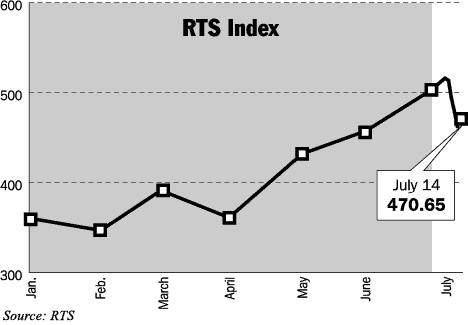| The battered stock market on Monday recovered a bit of
the billions of dollars it has lost since authorities first moved against
Yukos, but with no resolution of the conflict in sight it could be weeks
or even months before the full amount of the damage will be known.
The benchmark RTS index edged up 1.8 percent to close at 470.65 on the
back of Yukos, which reversed a week's worth of losses to close up 3 percent
at $12 per share, pushing its value up $800 million. But at just under
$27 billion, Yukos' market capitalization is still nearly $6 billion off
its all-time high set July 2 -- just hours before Platon Lebedev, chairman
of Yukos' parent company, was arrested and charged with defrauding the
state.

Aside from Monday's breather, however, it has been all downhill for the
market, making investors and even officials increasingly nervous over when
and how the attack on Yukos CEO Mikhail Khodorkovsky's empire will end.
"All of our work is becoming useless," said State Duma Deputy and budget
committee member Alexei Melnikov
of Yabloko, one of the non-centrist political factions funded by Khodorkovsky.
"The president has declared a goal to double gross domestic product by
the end of the decade, and we've been working on amendments to the Tax
Code and law on natural resources." As a group, the nation's top businessmen
have urged President Vladimir Putin to rein in what they see as a political
attack on Khodorkovsky. But on Monday, a number of heavy hitters -- both
Russian and foreign -- spoke out individually. "I do not understand what
is happening to Yukos, there are several explanations, but none of them
is complete," United Heavy Machinery chief Kaha Bendukidze said. The action
against Yukos, he told Interfax, has cost shareholders in all Russian companies
a total of $10 billion. "This guy [Khodorkovsky], one of the richest and
most powerful in the world, wants to become a politician, and that has
upset people in the administration," said legendary emerging market investor
Mark Mobius, who sits on the board of rival LUKoil. "This administration
is upset because they don't have the resources that Yukos has," he told
Bloomberg. Melnikov said the move against Yukos is a cause for concern
-- even among people who have little, if any, respect for so-called oligarchs
-- and called on Igor Sechin and former KGB operative Viktor Ivanov, who
are now in Putin's administration and who are widely believed to be behind
the Yukos attack, to provide some answers. "I would very much like to hear
deputy heads of the presidential administration Sechin and Ivanov reply
to questions they are being asked by officials at the very top and by civil
society." The presidential administration refused to comment Monday. On
the trading floor, the tension was palpable. "Rumors are flying, global
[funds] are selling everything they have, longtime players in the Russian
market are finally deciding Russia is no good and moving out -- the reaction
is stronger than expected and almost definitely stronger than events warrant,"
Sam Barden, head of equity sales at Lebedev's investment bank Trust, wrote
to clients. Mobius even warned that Yukos' record-setting $40 billion merger
with smaller rival Sibneft, announced in April, may come unglued: "It could
very well be canceled -- not all the t's have been crossed and all the
i's dotted. ... Over the short term there will be a lot of volatility [in
the market]." Others, however, see the 20 percent decline in Yukos' share
price as a buying opportunity. Commerzbank oil and gas analyst Ivan Mazalov
said he had changed his recommendation on the company from "accumulate"
to "buy" because it has fallen so far below fair value.
See also:
the original at
www.themoscowtimes.com
YUKOS Case
|